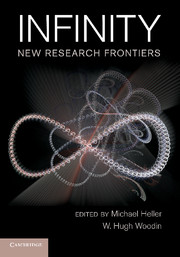Book contents
- Frontmatter
- Contents
- Contributors
- Preface
- Acknowledgments
- Introduction
- I Perspectives on Infinity from History
- II Perspectives on Infinity from Mathematics
- III Technical Perspectives on Infinity from Advanced Mathematics
- IV Perspectives on Infinity from Physics and Cosmology
- V Perspectives on Infinity from Philosophy and Theology
- 11 God and Infinity: Directions for Future Research
- 12 Notes on the Concept of the Infinite in the History of Western Metaphysics
- 13 God and Infinity: Theological Insights from Cantor's Mathematics
- 14 A (Partially) Skeptical Response to Hart and Russell
- Index
- References
13 - God and Infinity: Theological Insights from Cantor's Mathematics
Published online by Cambridge University Press: 07 June 2011
- Frontmatter
- Contents
- Contributors
- Preface
- Acknowledgments
- Introduction
- I Perspectives on Infinity from History
- II Perspectives on Infinity from Mathematics
- III Technical Perspectives on Infinity from Advanced Mathematics
- IV Perspectives on Infinity from Physics and Cosmology
- V Perspectives on Infinity from Philosophy and Theology
- 11 God and Infinity: Directions for Future Research
- 12 Notes on the Concept of the Infinite in the History of Western Metaphysics
- 13 God and Infinity: Theological Insights from Cantor's Mathematics
- 14 A (Partially) Skeptical Response to Hart and Russell
- Index
- References
Summary
Introduction
Western monotheism begins with the fundamental assertion that God is Absolute Mystery, the incomprehensible ground and source of being itself, and that we can speak about God only because God first speaks to us in revelation received in faith and understood always inadequately through reason, tradition, and experience. Theology as self-critical reflection on revelation and religious experience starts with what we do not understand before it seeks to say something about that which we understand at least in part. In the long traditions of Western monotheism, the way of unknowing leads, and the way of knowing follows behind. These ways have come to be called the via negativa (the negative way of denial) and the via positiva (the positive way of affirmation), respectively. This means, in turn, that when we talk about God we should begin by attempting to say something about those divine attributes that we only know by negation, that is, by their utter contrast with our experience of ourselves and our universe. We should begin with what are called “apophatic” statements, from the Greek αποφατικος for “negative” or “denial.” With this we return full circle to the fundamental assertion that the most inclusive divine attribute is the incomprehensibility of God. But this incomprehensibility, too, tells us something inestimably important about God's relation to the world: it is only by being incomprehensibly different from this world that God can be the source of this world and its final home.
- Type
- Chapter
- Information
- InfinityNew Research Frontiers, pp. 275 - 289Publisher: Cambridge University PressPrint publication year: 2011
References
- 3
- Cited by



